Another Veteran Diplomat Leaves Biden's Iran Negotiating Team
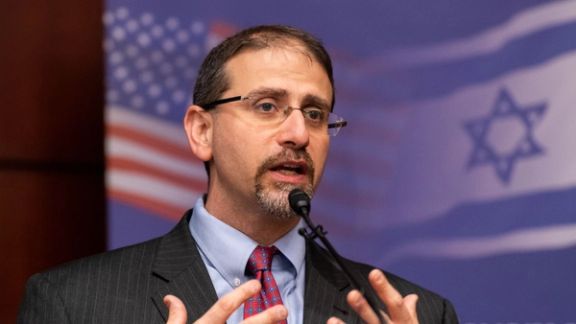
A veteran diplomat who was a former US envoy to Israel has quitted Biden's team at the nuclear talks to restore the 2015 deal with Iran.

A veteran diplomat who was a former US envoy to Israel has quitted Biden's team at the nuclear talks to restore the 2015 deal with Iran.
According to Haaretz on Tuesday, Dan Shapiro -- who served as US ambassador to Israel under the Obama administration -- left Iran team after only seven months as a special government employee and part-time senior adviser.Shapiro was known as the "Israel whisperer" in Special Envoy for Iran Rob Malley's team due to his deep understanding of the US-Israel relationship, and is expected to join Washington-based think tank Atlantic Council.Richard Nephew and two other leading negotiators stepped down in recent months due to frustrations with the administration’s Iran policy.Nephew, who is regarded as the architect of Washington’s sanctions on Iran and was serving as Malley’s deputy until early December, to elaborate on the reasons behind his move.Nephew said he stepped down from his post “due to a sincere difference of opinion concerning policy”, adding that “Although my views and record have been and continue to be mischaracterized by quite a few people, I do not intend to convey any further details at this time or in public, given the ongoing nature of discussions in Vienna”.
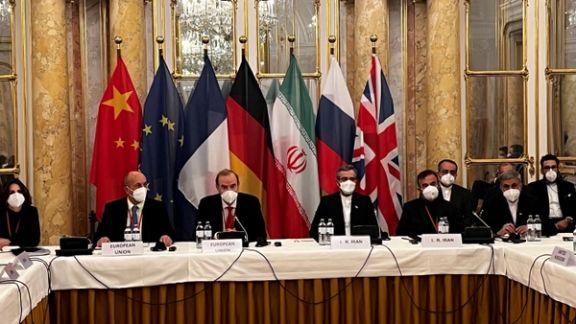
Another member of President Joe Biden’s Iran negotiating team has resigned amid growing criticism at home and abroad of an impending nuclear deal with Tehran.
Dan Shapiro, who served as US ambassador to Israel during the Obama administration and is a specialist on US Middle East policy, has left the Iran team led by Special Envoy Rob Malley after just seven months, Haaretz reported on Tuesday.
This follows the departure of sanctions expert Richard Nephew in December and two other members of Malley’s team. Although Shapiro has not expressed any misgivings about the way the nuclear talks have been handled in Vienna, Nephew in February disclosed in a series of tweets that he stepped down from his post “due to a sincere difference of opinion concerning policy.”
On Monday, Senator Chris Coons, a close supporter of President Joe Biden told Iran International he was apprehensive over the possibility that the US might remove Iran’s Revolutionary Guard from its list of Foreign Terrorist Organization (FTO). He also expressed deep misgivings about Iran’s regime, saying that its behavior on several fronts has become worse in the last two years.
Senior Republican Senator Lindsey Graham told Jewish insider on Monday that an Israeli strike on Iran appeared to be the most likely way to stop Iran from acquiring nuclear weapons. He ruled out that the Islamic Republic’s Supreme Leader Ali Khamenei would have a “change of heart” and using sanctions, although to an extent effective, could not guarantee the same outcome.
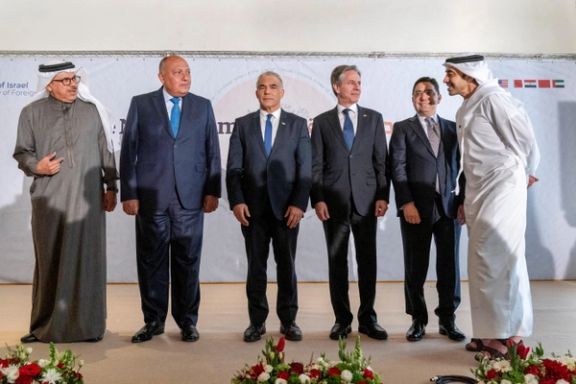
“If you don’t [understand] that, you’re making a huge mistake,” Graham told Jewish Insider. “This is never going to end short of a nuclear weapon unless somebody stops them.”
The Senator explained that he is putting together legislation that would require a close watch on Iran’s nuclear activities and a report to US Congress every 120 days about any “weaponization efforts, missile technology, proliferation and violations of International Atomic Energy Agency inspection regime.”
Graham maintained that if any Iranian deviation toward weaponization is observed, the White House would be required to come up with a plan to stop it.
Despite the recent ‘Negev Summit’ where Secretary of State Antony Blinken tried to show a mood of unity with Israel and Arab states that have normalized ties with Israel, deep concerns regarding the Biden Administration’s Middle East policies persist.
In an opinion piece published by the Jerusalem Post on Tuesday, Mohammed Alyahya, a Saudi researcher with the Hudson Institute argued that there is a serious “crisis” between Washington and Riyadh, smacking of a “divorce”.
Alyahya argued that since former president Barack Obama agreed to the 2015 Iran nuclear deal, the JCPOA, it became clear to Saudis that the US was abandoning its 70-year policy of protecting allies in the region. He agreed to a flawed deal in exchange for releasing billions of dollars to Iran’s Revolutionary Guards who arm militants around the region.
President Biden’s pursuit of renewing the JCPOA, which Donald Trump abandoned in 2018, is a continuation of the same Obama policy – or worse, Alyahya maintained.
Although his assessment might sound pessimistic, but a large-scale drone and missile attack om Saudi oil installation by Iran-backed Houthi forces past week inevitably reinforces the perception of a weak or indecisive US posture toward the Islamic Republic.
Historically, any threat to Middle East oil production would have solicited a decisive response from Washington – during the Cold War or in the following years. The swift and massive US reaction to Saddam Hussein’s invasion of Kuwait was a solid proof for regional counties.
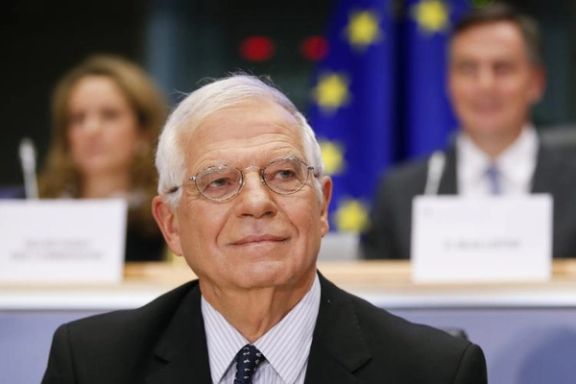
The European Union's top diplomat Josep Borrel says talks to revive the 2015 Iran nuclear deal are stuck by Tehran after a hurdle thrown by Russia was overcome.
"It’d be a shame not to reach some sort of an agreement when we're so near to reaching one,” Borrel told the European Parliament on Monday after returning from his tour in Persian Gulf Arab states.
“But I cannot guarantee that we will reach an agreement", he added.
"It seems that two weeks ago, we almost had it. Then Russia came, Russia was obstructing" because Moscow was looking for leverage over the West in its ongoing war in Ukraine, Borrell told EU lawmakers in Brussels.
According to the EU top diplomat, Russia wanted to prevent sanctions on Iranian oil being lifted "because if Iran started producing oil there’ll be more supply in markets and that's not in the interest of Russia".
The landmark agreement that Tehran signed with the United States, Britain, France, Germany, Russia, and China in 2015 allowed for the easing of sanctions against Iran in return for curbs on the country’s nuclear program.
But then-President Donald Trump unilaterally pulled the United States out of the deal in 2018, and started reimposing crippling economic sanctions against Iran, while Tehran began rolling back on most of its commitments under the accord.
Over the past months, negotiations have taken place in Vienna to bring back the pact, with Borrell's deputy Enrique Mora coordinating the talks.
The volatile oil markets have been closely watching progress of the Vienna talks as the lifting of restrictions on Iranian crude export could help counterbalance disruptions caused by the Russian invasion of Ukraine.
But now that Moscow has lifted its objection, other demands have been raised that aren’t part of the nuclear deal, such as the status of Iran's Islamic Revolutionary Guards Corps (IRGC), Borrell said.
Tehran has demanded that the United States remove the IRGC from its list of Foreign Terrorist Organizations (FTOs).
Borrell's downbeat assessment of the talks in the Austrian capital comes three days after he announced that the parties involved could reach an agreement to restore the nuclear deal in "a matter of days".
On March 11, the EU official said the final text of an agreement was "essentially ready and on the table."
Speaking on March 5, Russian Foreign Minister Sergei Lavrov said that sanctions imposed on Moscow had created "problems from the point of view of Russia's interests" regarding the restoration of the Iran nuclear accord, formally known as the Joint Comprehensive Plan of Action (JCPOA).
Such sanctions could complicate Moscow's involvement in Tehran's civilian nuclear program and trade with Iran, including arms sales, said Lavrov, who demanded "written guarantees" from the United States.
But Moscow apparently backed off later when Washington and its European allies refused to budge and limited Russian demands to JCPOA-related cooperation, something that has apparently been guaranteed in the text of the agreement being negotiated.
Russia is widely expected to play a central role in implementing a restored JCPOA, especially in removing Iran's stocks of enriched uranium exceeding limits set by the deal, a task it undertook when the agreement was reached in 2015.
The Biden administration has apparently agreed with a Russian demand that would involve lucrative deals for Moscow to expand Tehran’s civilian nuclear program, including the construction of two additional nuclear reactors at the Bushehr power plant.
Borrell said on Monday that his team were "shuttling between Tehran, Vienna, Washington trying to find a solution."
Mora travelled to Tehran over the weekend and met with Iran’s top negotiator Ali Bagheri-Kani and Foreign Minister Hossein Amir-Abdollahian in a bid to close the “remaining gaps”.
Iranian officials insist that Tehran is willing to conclude the talks and sign "a good, strong, and lasting agreement" if the US is "realistic" and makes "a political decision".
Last week, a spokesman for the US State Department a possible deal with Iran could be close, while also warning it was "neither imminent nor is it certain".
Bipartisan opposition has been growing in Washington against the Vienna talks and the prospect of removing the IRGC from the U.S. terrorism list.
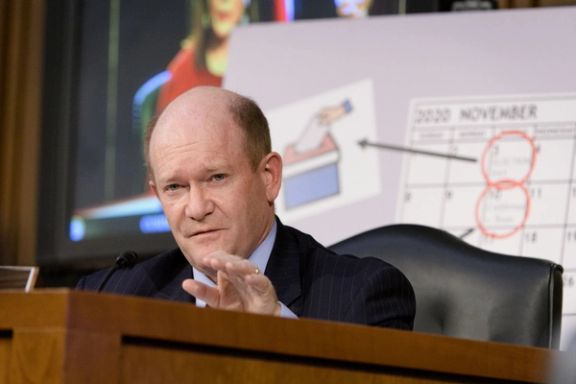
Iran’s Revolutionary Guard is a “dangerous and destabilizing actor” and it is not clear why the United States would remove their terrorist designation, Senator Chris Coons told Iran International on Monday.
In the final stages of negotiations to revive Iran’s 2015 nuclear agreement, Tehran has been demanding that the US remove the Revolutionary Guard (IRGC) from its Foreign Terrorist Organization (FTO) list. The Biden Administration has not decided yet, but most Senate Republicans and some Democratic lawmakers have opposed such a move.
Sen. Coons said that although he does not have full information on the matter, “it would have to be something very significant” to warrant IRGC’s delisting.
Regarding the Islamic Republic in general, Coons said it is doing at least three bad things: Consistently and at large scale repressing the human rights of the Iranian people; exporting violence in the region through support for Hezbollah, for Houthis, through the IRGC and other groups…and continuing to develop ballistic missile technology that threatens the whole region.
Sen. Coons, who is a close supporter of President Joe Biden and is not opposed to his policy of reviving the JCPOA, said that besides nuclear enrichment, in three other areas Tehran’s “behavior has got worse, not better over the last couple of years.”
He maintained that these issues should be addressed in future negotiations, because focusing just on the nuclear issue “would be a miss.”
“A successful deal should address a whole spectrum of what they do, all of them. That does not seem to be on the agenda of what Iran is willing to discuss,” the Senator added.
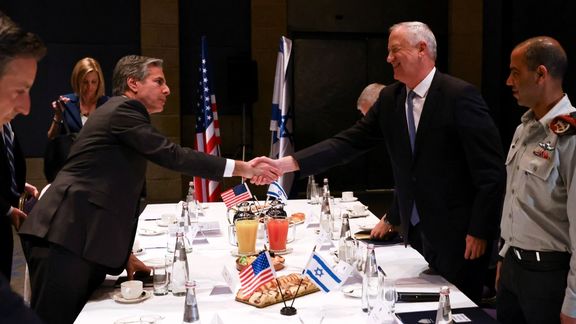
The US Secretary of State has tried to assure Israelis that Washington will work with Tel Aviv to deny Iran atomic weapons, with or without a nuclear deal.
The issue of removing Iran's elite Revolutionary Guards (IRGC) from the US list of Foreign Terrorist Organizations (FTO), which Iran now expressly says is a pre-condition to agreeing to the restoration of the 2015 nuclear deal, Joint Comprehensive Plan of Action (JCPOA) appears to be at the center of Arab foreign ministers in Tel Aviv.
The US Secretary of State, Antony Blinken, who is also participating in a two-day summit attended by foreign ministers of the United Arab Emirates, Egypt, Morocco, and Bahrain, tried to reassure Israeli and Arab partners of the United States on Sunday that Iran will not be allowed to build a nuclear bomb whether the JCPOA is restored or not.
The extraordinary summit of the Arab countries that have normalized their relations with Israel in the past eighteen months is hosted by Israel’s prime minister, Naftali Bennett.
“But whether there’s a deal or not, our commitment to the core principle of Iran never acquiring a nuclear weapon is unwavering. And one way or another, we will continue to coordinate closely with our Israeli partners on the way forward,” Blinken said at a joint press conference with Israel’s foreign minister, Yair Lapid. “We are both committed, both determined, that Iran will never acquire a nuclear weapon,” he said.
The US has also sought to reassure Israel and Arab countries that it would not surrender to Iran's demand over delisting of the IRGC whose involvement in regional politics and conflicts – including Yemen, Lebanon, Iraq, and Syria.
Us allies in the region have long been concerned over the Biden Administration policy of restoring the JCPOA in exchange for lifting crippling sanction the former US administration imposed on Iran.
“This is not a deal that is intended to resolve that issue. Many in the region view the IRGC in the same way we view them. I can tell you that the IRGC will remain sanctioned under US law, and our perceptions, our views, our policy towards the IRGC have not changed,” the US Special Representative for Iran, Robert Malley, said at the Doha Forum Saturday.
But in a meeting with the Lebanese Prime Minister, Najib Mikati, on the side-lines of the Doha Forum on Monday, Supreme Leader Ali Khamenei's advisor and former foreign minister Kamal Kharrazi insisted that the IRGC is its national army and the country's national army could not be listed as a terrorist group. “The real thing is that IRGC is very important for Iran, and they are not going to compromise on that,” he said.
Seattle-based professor and political commentator Jalil Roshandel told Iran International Monday that in his view, the US has decided to restore the JCPOA but is still not sure about Iran's demand to delist the IRGC. It appears that under the immense pressure of Congress and US allies in the Middle East, the Biden administration is now more inclined to reject the demand, he said.
Roshandel said concerns over Iran's activities in the region may incite the participants in the summit in Israel to strike a security deal. "All of this is pressure on Biden [to reject Iran's demand] … And Iran has not shown any signs to assure the West that the IRGC will not behave as before in regional conflicts and be more friendly even if it is delisted."

French Foreign Minister Jean-Yves Le Drian said Monday that a nuclear deal between Iran and world powers was near even though a few items remain to be settled.
"We are near an agreement," Le Drian said at a news conference in Doha.
France is one the original signatories of the 2015 nuclear agreement with Iran known as JCPOA, along with the United Kingdom, Germany, Russia and China. The United States withdrew from the agreement in 2018.
Le Drian's comments came in contrast to a bleaker assessment of the Iran nuclear situation offered by the United States on Sunday.
On Sunday, US Special Envoy for Iran Robert Malley said he was not confident that a nuclear deal between world powers and the Islamic Republic was imminent, dampening expectations after 11 months of talks in Vienna that have stalled.
One of the last major issues remaining in the negotiations is Iran’s demand from the United States to lift terrorism sanctions imposed on the Revolutionary Guard by former president Donald Trump’s administrations. The Biden Administration is apparently trying to find a compromise on the issue, a move that has met with strong criticism domestically and by its allies in the region.
With reporting by Reuters